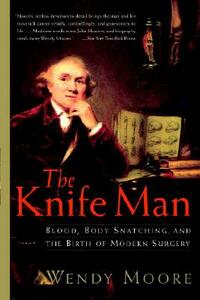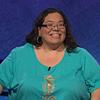You need to sign in or sign up before continuing.
Take a photo of a barcode or cover
An absolutely fabulous book about the begins of modern surgery. A must read. And I went to the Huntarian Museum in London. Fascinating! thousands of specimens!
informative
inspiring
reflective
fast-paced
An outstanding tale of obsession and dedication. Hunter was a brilliant and audacious man, obsessed with improvement and with a practical understanding of anatomy and how it related to health and disease. Great book.
Fascinating, well researched, and incredibly readable, I found this to be excellent. It wasn't a fast read for me, but I still enjoyed it thoroughly. Hunter was, quite simply, a brilliant and amazing man who refused to accept the beliefs at the time until and unless he could prove them to himself. It is truly amazing to me how far ahead of his time he really was.
The book covers his whole life, which encompasses a great number of concepts and experiences. Definitely a recommended read.
The book covers his whole life, which encompasses a great number of concepts and experiences. Definitely a recommended read.
Never ask me what I have said, or what I have written; but if you will ask me what my present opinions are, I will tell you.
~p173
Wendy Moore has written a wonderful, virtuosic biography of John Hunter. The man was a tour de force, and a pre-eminent figure in medicine, surgery, obstetrics, geology, evolution, and didactic style, at a time when the Enlightenment was emerging from the darkest ages of medical understanding. It is astonishing what the medical profession did not know in the mid to late 1700s.
Hundreds would come to study under Hunter’s tutelage at St. George’s Hospital, London, over decades. He had contempt for the written word and proudly showed a prospective student’s father a room of half-dissected cadavers: “These are the books your son will learn under my direction; the others are fit for very little.”
Hunter spent time in the British military, discovering that dilating gunshot wounds and removing all bullet fragments was often more morbid than leaving the wounds alone.
He spent years in dentistry, performing dental transplants from young paupers directly into the caried mouths of sugary-tea-swilling upper crust Londoners. He published one of the first texts on the topic.
He discovered that the testes descended gradually in utero. He described the morphologic development of the gravid uterus with his brother, William.
He improved upon the technique of ligating popliteal aneurysms, to that point an often-fatal procedure.
Hunter was dissecting everything he could find, smelling and tasting gastric juices and semen.
He collected ~7,000 animal specimens, most without pathology, which informed his understanding of human anatomy, physiology, and other disciplines.
He was prescient in predicting Darwin’s publications of the following century, by noticing the morphologic similarities among the thousands of animals specimens he dissected. Darwin would be a regular visitor and contributor to the Hunterian Museum after Hunter’s death.
Jenner (smallpox vaccine) was a pupil. Philip Syng Physick was the prospective student mentioned above. Hunter gave advice to Byron, Hume, the King, Benjamin Franklin, and thousands of commoners.
And he was deeply unethical by modern standards, and even by those of his own day. He was directly engaged in the body snatching trade his entire career. He bribed gravesmen to expressly counter the last known wishes of the deceased (a 7.5 foot-tall Irishman, for example), to boil his body and display the skeleton in his museum. He planned poorly and left his entire family penniless, and was betrayed by a longtime friend and student, who stole and destroyed much of his written work.
This is a wonderful read.
~p173
Wendy Moore has written a wonderful, virtuosic biography of John Hunter. The man was a tour de force, and a pre-eminent figure in medicine, surgery, obstetrics, geology, evolution, and didactic style, at a time when the Enlightenment was emerging from the darkest ages of medical understanding. It is astonishing what the medical profession did not know in the mid to late 1700s.
Hundreds would come to study under Hunter’s tutelage at St. George’s Hospital, London, over decades. He had contempt for the written word and proudly showed a prospective student’s father a room of half-dissected cadavers: “These are the books your son will learn under my direction; the others are fit for very little.”
Hunter spent time in the British military, discovering that dilating gunshot wounds and removing all bullet fragments was often more morbid than leaving the wounds alone.
He spent years in dentistry, performing dental transplants from young paupers directly into the caried mouths of sugary-tea-swilling upper crust Londoners. He published one of the first texts on the topic.
He discovered that the testes descended gradually in utero. He described the morphologic development of the gravid uterus with his brother, William.
He improved upon the technique of ligating popliteal aneurysms, to that point an often-fatal procedure.
Hunter was dissecting everything he could find, smelling and tasting gastric juices and semen.
He collected ~7,000 animal specimens, most without pathology, which informed his understanding of human anatomy, physiology, and other disciplines.
He was prescient in predicting Darwin’s publications of the following century, by noticing the morphologic similarities among the thousands of animals specimens he dissected. Darwin would be a regular visitor and contributor to the Hunterian Museum after Hunter’s death.
Jenner (smallpox vaccine) was a pupil. Philip Syng Physick was the prospective student mentioned above. Hunter gave advice to Byron, Hume, the King, Benjamin Franklin, and thousands of commoners.
And he was deeply unethical by modern standards, and even by those of his own day. He was directly engaged in the body snatching trade his entire career. He bribed gravesmen to expressly counter the last known wishes of the deceased (a 7.5 foot-tall Irishman, for example), to boil his body and display the skeleton in his museum. He planned poorly and left his entire family penniless, and was betrayed by a longtime friend and student, who stole and destroyed much of his written work.
This is a wonderful read.
You've probably never heard of John Hunter, but if you've ever had (and survived!) surgery, if you've ever been to the dentist, or if you've ever taken your pet to the veterinarian, you owe him some thanks. (Full disclosure: I have a personal interest of sorts in this story because my children are related to John Hunter and his almost equally distinguished brother William on their father's side.)
John Hunter started off as a penniless country lad from Scotland and ended up as a penniless, much-admired, much-reviled anatomist and surgeon; the story of his life and controversial opinions will fascinate anyone interested in books on the history of medicine or science. Hunter learned the art of dissection at his older brother William's lab, his subjects illicitly stolen bodies from local gibbets and graveyards; he rose to prominence and was much-loved by his students, although not by the other surgeons at the hospital where he practiced.
In a time when little was known of the origins of life on earth or of the workings of the human body, John Hunter sought to bring light to these and many other subjects; unfortunately, some of his ideas were too far advanced for others to accept. I was amazed not only by how much knowledge Hunter developed and shared with his students (his disciples included Edward Jenner, who invented the smallpox vaccine), but by how his detractors, including his own brother-in-law, worked so diligently after Hunter's death to try and erase every mention of him from history. Highly recommended.
John Hunter started off as a penniless country lad from Scotland and ended up as a penniless, much-admired, much-reviled anatomist and surgeon; the story of his life and controversial opinions will fascinate anyone interested in books on the history of medicine or science. Hunter learned the art of dissection at his older brother William's lab, his subjects illicitly stolen bodies from local gibbets and graveyards; he rose to prominence and was much-loved by his students, although not by the other surgeons at the hospital where he practiced.
In a time when little was known of the origins of life on earth or of the workings of the human body, John Hunter sought to bring light to these and many other subjects; unfortunately, some of his ideas were too far advanced for others to accept. I was amazed not only by how much knowledge Hunter developed and shared with his students (his disciples included Edward Jenner, who invented the smallpox vaccine), but by how his detractors, including his own brother-in-law, worked so diligently after Hunter's death to try and erase every mention of him from history. Highly recommended.
This is the biography of one John Hunter, a famed (and notorious) surgeon/anatomist that revolutionized the medical field. A great companion to "The Greatest Benefit to Mankind" (Porter) and "A Medical Cabinet of Curiosities" (Bondeson).
informative
inspiring
lighthearted
medium-paced





